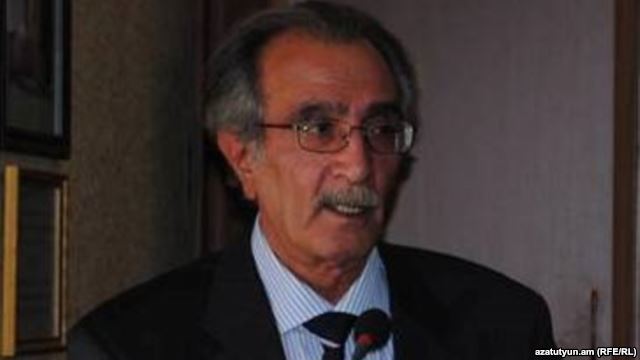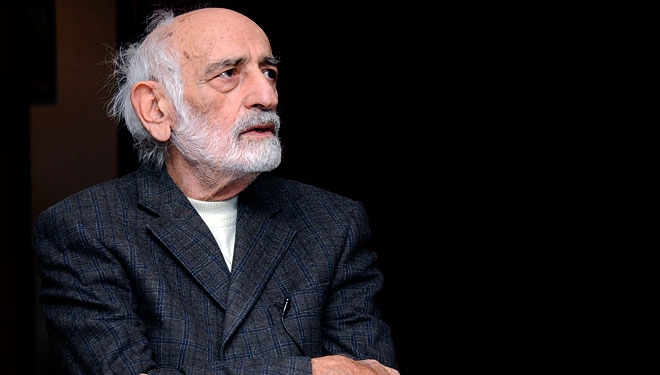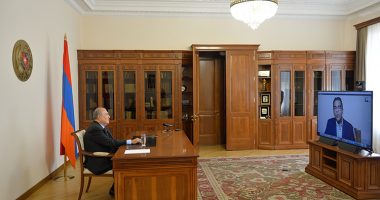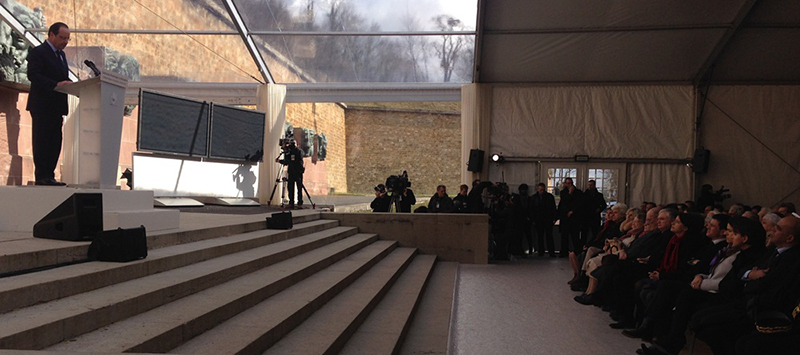YEREVAN (RFE/RL) — An exiled former Azerbaijani military leader currently campaigning for the rights of an ethnic minority in Azerbaijan visited Nagorno-Karabakh on Thursday two decades after confronting Karabakh Armenian forces on the battlefield.
Alikram Hummatov, a retired colonel who had served as Azerbaijan’s deputy defense minister, deplored the 1991-1994 war and called for a peaceful resolution of the Nagorno-Karabakh conflict as he met with university students in Stepanakert. His messages of peace and criticism of the current Azerbaijani government repeatedly drew cheers from an audience that is too young to remember the horrors of the war.
“It’s nice to be in Artsakh,” Hummatov declared, using the Armenian name of the disputed territory. “I believe that we must do everything to establish peace in the region so that our beloved children live, create and study in peaceful conditions.”
“I always say that if you fight in a war like a real man, you must also be able to make peace like a real man,” he added.
Asked by RFE/RL’s Armenian service (Azatutyun.am) how he feels about visiting a region which he had sought to forcibly put back under Azerbaijani control, Hummatov said, “Yes, I went to war against Nagorno-Karabakh and I don’t make secret of that, but today I hate war because of having seen it. What gave me the right to send young men to the battlefield? This and many other questions are keeping me restless.”
Hummatov, who also met with Karabakh parliament speaker Ashot Ghulian, rose to prominence in Azerbaijan in late 1991 as one of the organizers of first Azerbaijani army units. He set up a battalion, subsequently expanded into a brigade, that largely consisted of fellow Talysh, an Iranian-speaking ethnic group concentrated in Azerbaijan’s southeastern region bordering Iran. The unit battled Armenian forces at various sections of the Karabakh frontline in 1992-1993.
Hummatov became deputy defense minister several months before proclaiming in June 1993 a short-lived Talysh-Mughan Autonomous Republic amid political turmoil in Baku. He was deposed and arrested later in 1993. He subsequently received a life sentence on treason charges.
The Azerbaijani authorities pardoned and freed Hummatov in 2004 under pressure from the Council of Europe. The 65-year-old has since lived in Europe.
Hummatov travelled to Karabakh from Armenia where he inaugurated on Tuesday a graduate program of Talysh studies at Yerevan State University (YSU). Addressing dozens of university professors and students, he praised the initiative approved and clearly encouraged by the Armenian government. He claimed that the Azerbaijani authorities have been suppressing the cultural rights of Talysh as part of a long-running policy of forced assimilation.
According to the Regnum news agency, Hummatov also called for the revival of the Talysh republic, suggesting that it form a “confederation” with the rest of Azerbaijan.
Hummatov’s trip to Armenia and Karabakh has caused a stir in Baku, with many politicians there condemning it as high treason and accusing the Armenians of fanning Talysh separatism. “The Armenians are thus trying to show that Nagorno-Karabakh’s existence within Azerbaijan is impossible,” 1news.az quoted Zahid Oruj, a pro-government parliamentarian, as saying on Wednesday.
Another news agency, Salamnews.org, reported that Talysh leaders in Azerbaijan have issued a statement condemning Hummatov and saying that he cannot speak for their community. “The Talysh have given many martyrs in the battles for Karabakh’s liberation from the Armenian aggressors,” they said.
Azerbaijani officials accused the Armenian side of whipping up separatist sentiment among their country’s Talysh and other minorities even before Hummatov’s high-profile visit. In particular, they condemned the launch last March of Talysh-language radio broadcasts from Karabakh.
The Voice of Talyshstan radio station was founded by Garnik Asatrian, a prominent Armenian academic who also set up the Talysh studies program at YSU. Welcoming Hummatov at Armenia’s largest university on Tuesday, Asatrian denied any ulterior motives behind the Armenian interest in the Talysh people.
Asatrian insisted that YSU is simply expanding its department of broader Iranian studies. “The Talysh are one of the largest Iranian ethnic groups,” he said. “Besides, despite the religious difference, of all indigenous peoples, the Talysh are the closest to the Armenians in terms of culture and genetic parameters.”










